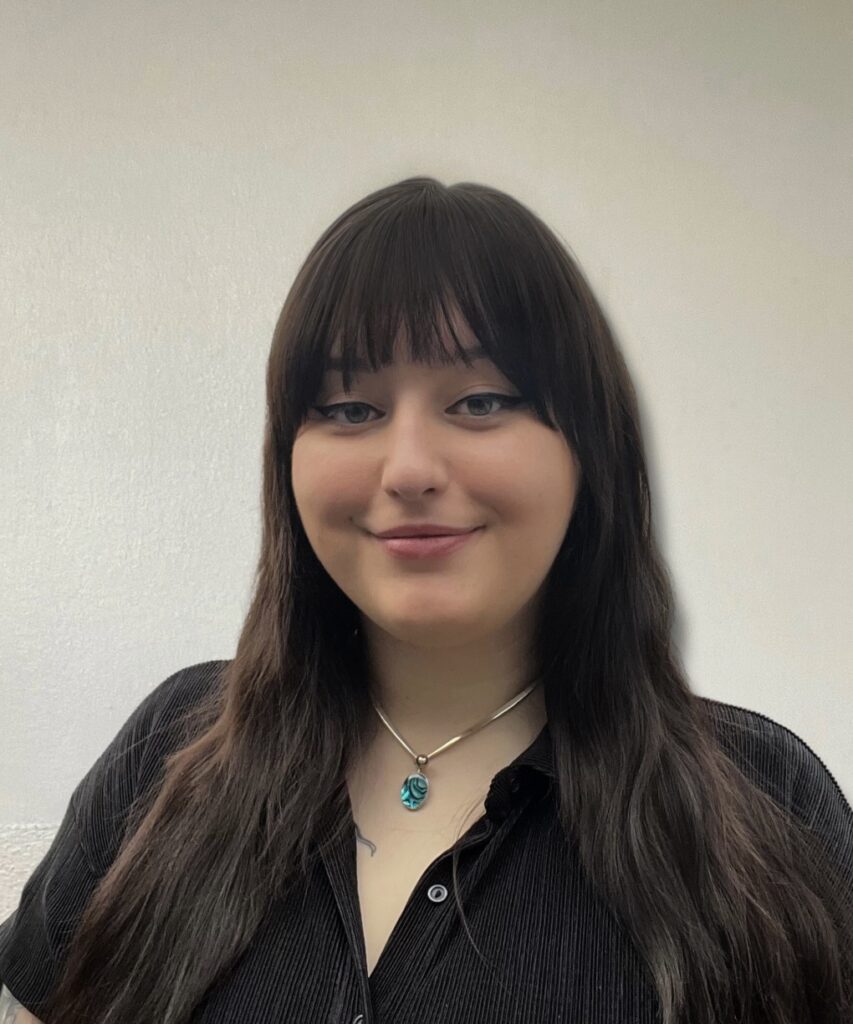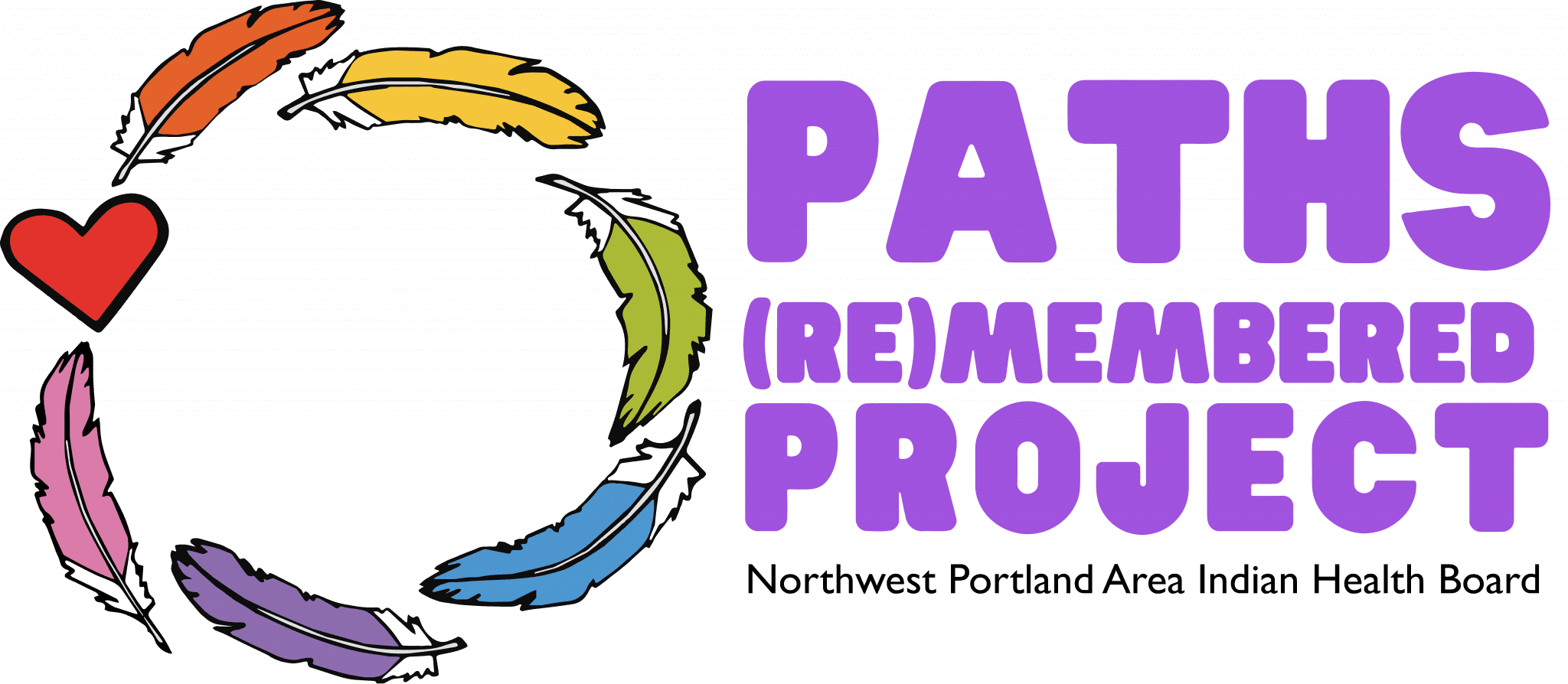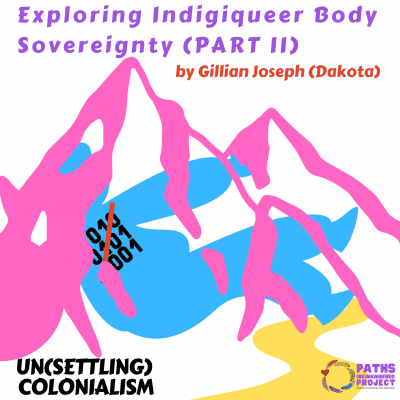Unsettling Colonialism through Indigiqueer Body Sovereignty
A Quick Recap
In Part 1 of the Body Sovereignty series, we briefly looked at the relationship between identity and body sovereignty. We concluded that our identity impacts how we understand and reclaim body sovereignty, because identity shapes our perception of the world and how we navigate it. But, we didn’t go deeper in our exploration of the ways in which identity and body sovereignty are intertwined.
How Do We Define Identity?
Identity is broadly defined as a person’s sense of self. It includes our characteristics, relationships, roles, experiences, beliefs, and qualities. Of course, defining identity in just a few words can make it feel one-dimensional. In reality, identity is complex and fluid; it is a lifelong journey that we are all on. Our identity is shaped by culture, history, and society, and influences the opportunities and challenges we encounter. Because identity is intertwined with systems of power, it affects the way we view and treat people, and the way people view and treat us. Ultimately, identity is an intersection of the countless individual aspects of our selves that make up who we are. These individual aspects may be something we carry forever or for a finite period of time, may be prominent parts of our lives or not so important, may be something that we grapple with or feel confident in. Identity is a place where many truths can exist at the same time, and everyone has a unique connection to their identity.
Identity as Limiting vs. Identity as Expansive
It’s important to discuss how identity can be both limiting and expansive, because our identity and the aspects and traits that it is composed of can create lots of boundaries that we must negotiate. Those boundaries can be imposed on us by society, and can also be internalized. At the same time, our identity can be a place of self-exploration, of sovereignty, and of empowerment.
As 2SLGBTQ+ Indigenous people, we are probably keenly aware of how our identities have been weaponized against us, ignored, and oversimplified. For centuries, colonial entities and non-Indigenous people have attempted to decide who is Indigenous and interpret what it means to be Indigenous. Our diverse identities and networks of kinship and community have been reduced time and again to blood quantum. We are subjected to a sweeping, Pan-Indigenous perspective that tells us we are all the same, stereotypes us, and defines us only by our experiences with colonialism. These actions violate tribal sovereignty and have far-reaching consequences that harm Indigenous people in a multitude of ways. From worsening health and wellbeing outcomes to displacement from homelands and removal of culture, we know that our identity as Indigenous people is policed and can be a site of trauma.
While I recognize all of this as true, I also believe that my identity as an Indigenous person is a site of expansiveness. By this, I mean that being Indigenous has been fundamental in how I’ve explored my gender and sexuality, how I build relationships and community, and how I reclaim and exert body sovereignty. My identity as an Indigenous person has led me to interrogate the world around me, and especially how colonialism has manipulated so many parts of our lives. When I connect with my ancestors, release myself from societal expectations of gender, and care for myself by spending time with the land or water, I am practicing body sovereignty by refusing the limitations of colonialism. My Indigeneity leads me to all the countless possibilities that are beyond colonial concepts of who we are supposed to be and how we are supposed to live.
Dealing with the Binaries of Colonialism
At times, it can seem impossible to deal with all of the confines that are placed on us as 2SLGBTQ+ Indigenous people. I’ve especially struggled with the binaries that colonialism creates and upholds. Binary systems force us to group things into two separate, oppositional categories; think about the gender binary, which falsely categorizes gender into only male or female. Colonialism relies on binary ways of thinking to enforce the idea that one group is inherently better than its opposing group, and to bury the abundance that lives beyond binaries. When people don’t fit neatly into binary categories, they can be demonized, repressed, and forced to conform.
Confronting colonial binaries by questioning and refusing them is something that many of us have already done just by exploring our identities and body sovereignty. Learning about and connecting to the richness of gender that existed – and continues to exist – in our tribal nations is one concrete example of this. Rediscovering how our ancestors thought about and identified themselves, interacted with their communities, and loved each other shows us that we have always existed beyond binaries. When we reclaim ideas, words, and identities that colonialism tried to erase, we are exerting our body sovereignty.
We don’t have to define ourselves and construct our identities around colonialism. However, we live in a world that can limit our possibilities, our language, and even our imagination. There’s not one clear cut way to navigate such contradictory realities; it is difficult to even find the words to talk about these complexities. Being gentle and compassionate should be foundational in how we approach the relationships we have with ourselves.
Finding Joy and Unsettling Colonialism
Our existence alone unsettles colonialism. We as 2SLGBTQ+ Indigenous people living our lives are actively proving that colonialism and its binary ways of thinking can never succeed in erasing us. And, I believe that when we find joy in our identity and our body sovereignty, we are working to heal intergenerational colonial trauma. So, it’s incredibly important that we find spaces and community that celebrate who we are and empower us as sovereign people.
To better understand these kinds of spaces, I invite us to look to our Indigenous kin in other parts of the world, such as Kaupapa Māori transdisciplinary researcher Ashlea Gillon. Ashlea discusses Te Matatini (Ki Te Ao), Aotearoa’s national kapa haka competition, as a sovereign space where Māori people are re-centered, re-normalized, re-prioritized, and able to exert their body sovereignty and have their body sovereignty recognized. She argues that sovereign spaces can exist despite the colonial realities that we live in, because sovereignty is fluid, and is both a process and an outcome. She describes sovereign spaces as spaces that are controlled by Indigenous people, center Indigenous people, and allow Indigenous people to fully express themselves.
Sovereign spaces are a place that we as Indigenous people can find safety, empowerment, healing, validation, and joy in. They might exist in the form of powwows, community gatherings, ceremony, language learning classes, or book clubs. They could be established, or we might have to work with others to create them. I want to remind us that there will always be sovereign spaces where we are valued and loved for who we are. It is in these spaces that we can continue to explore and reclaim our identities, body sovereignty, and joy, and unsettle colonialism and its binaries.
Resources
https://www.journal.mai.ac.nz/content/body-sovereignty-and-te-matatini

Gillian Joseph (they/them) is a queer 2-Spirit Ihaŋktoŋwaŋ and Mdewakaŋtoŋ Dakota storyteller who grew up as a guest on Waxhaw and Catawba lands. Alongside writing, they work in the mental health field with a focus on Indigenous sovereignty.


